Art World
Truman Capote’s ‘Swans’ Were Art World Doyennes, Too
The spurned socialites Babe Paley, C.Z. Guest, and Lee Radziwill were esteemed collectors and art world denizens.
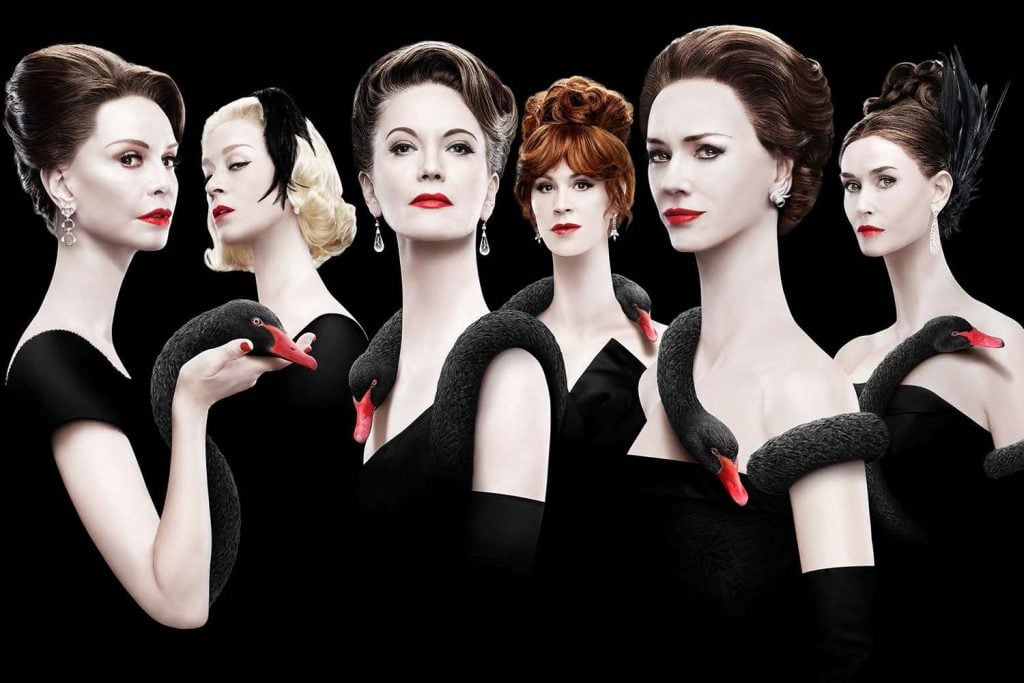
“Figure out what you want, darling, I know you’ve had your eye on that Van Gogh sunflower painting,” says Truman Capote, played by Tom Hollander, in the first episode of Feud: Capote vs. The Swans which premiered on FX this week. Capote is counseling a distraught Babe Paley, wife of CBS chief executive Bill Paley, who has recently discovered her husband’s ongoing affair with Happy Rockefeller, the governor of New York’s wife. Babe, utterly humiliated, says she wants a divorce. Capote, her confidante, advises against it. Why ruin an otherwise luxurious lifestyle, he argues. “He’ll buy you anything you want right now,” Capote adds. In this tony milieu, “anything” means masterpieces of art.
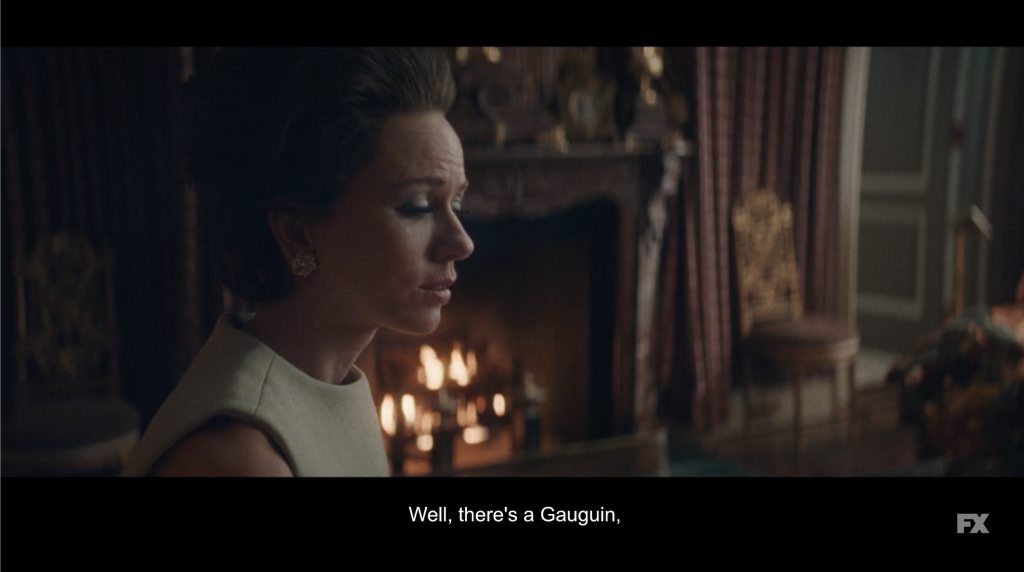
Naomi Watts as Babe Paley. Courtesy of FX.
“Well, there’s a Gaugin…The Seed of the Areoi coming up at Sotheby’s,” Babe murmurs, a slight twinkle in her eye. “And a nice Matisse Princess Margaret is trying to offload. Take them both. Woman With a Veil,” Capote adds, with a sly smile.
Amidst the haute couture, big hairdos, and gossipy dinners, art is what sets the tone in Ryan Murphy’s new series about the famed American writer and the doyennes of New York high society with whom he socialized. Nicknamed his “Swans,” Capote’s well-heeled muses included Babe Paley Lee Radziwill, Slim Keith, Ann Woodward, C.Z. Guest, Gloria Guinness, Marella Agnelli, and Pamela Harriman. These were women, Capote thought, whose outward glamour concealed struggles hidden just beneath the surface.
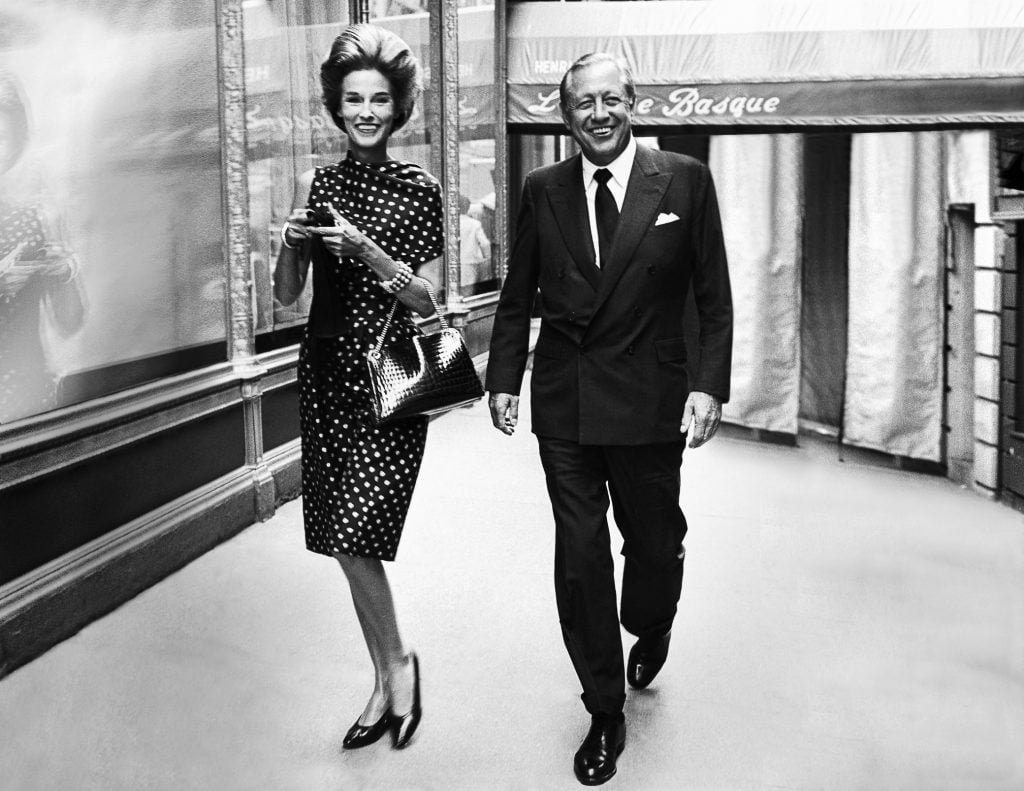
Babe and Bill Paley outside La Côte Basque, 1965. (Photo by Fairchild Archive/Penske Media via Getty Images)
Based on the 2021 book Capote’s Women: A True Story of Love, Betrayal, and a Swan Song for an Era by Laurence Leamer, the buzzed-about new show is a scintillating journey through Capote’s entree into these society women’s inner circle and the subsequent uproar and his ouster caused by the publication in Esquire of his scandalous “La Côte Basque, 1965,”—a thinly veiled chapter about their lives from a roman à clef that never materialized. While the show centers on the most salacious details of these women’s lives, in real life, several ‘Swans’ were regarded as esteemed collectors and muses to the masters of Modern art. Though Harriman and Agnelli don’t appear as characters in the show both had prized collections (Angelli’s collection formed the foundation of Turin’s Pinacoteca Agnelli; Harriman’s caused a nasty legal dispute with her step-children). Before tuning in, we got up to speed on the art world influence of the Swans whose stories are told in this new series.
Babe and William Paley, Powerhouse Collectors
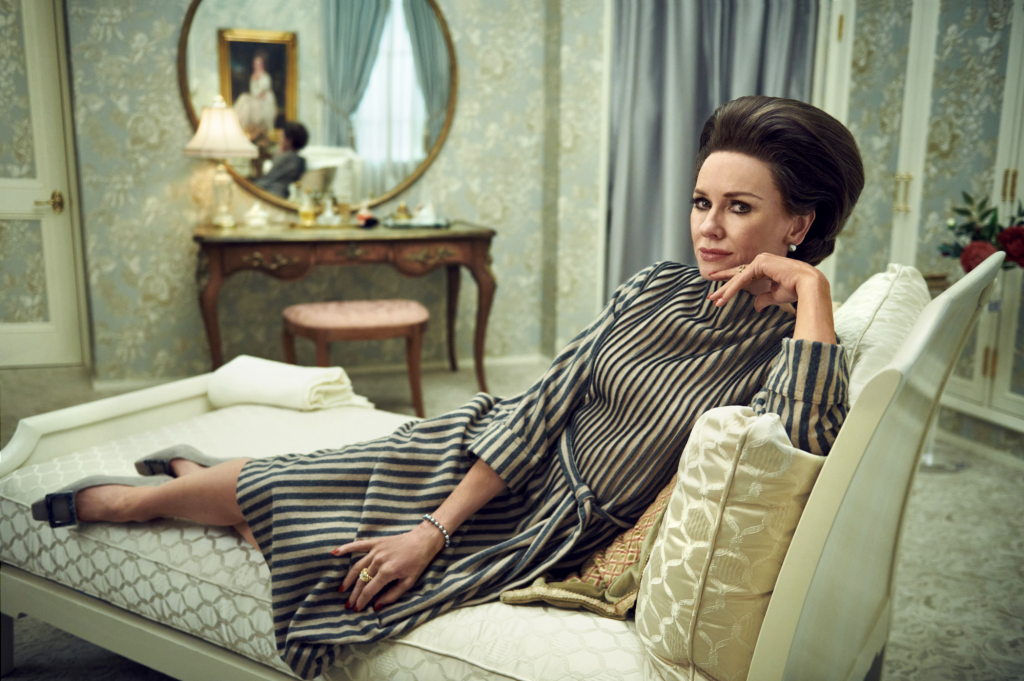
Naomi Watts as Babe Paley. Courtesy of FX.
Though Babe Paley and her ultra-powerful husband Bill had an often-tempestuous relationship, the couple shared an undeniable passion for Modern art. The writers for Feud have done their due diligence in researching the Paley’s world-class collection—and its provenance. The Paleys owned both Woman with a Veil and The Seed of the Areoi, mentioned in the first episode. Both paintings were ultimately donated to the Museum of Modern Art as part of the William S. Paley Collection, along with more than 80 other works from their collection. (Bill Paley was chairman emeritus at the museum at the time of his death in October 1990. Babe died of cancer in 1978). Other masterpieces of the couple’s collection include Degas’s Two Dancers (1905); Picasso’s Boy Leading a Horse (1905–6), and Derain’s Bridge over the Riou (1906).
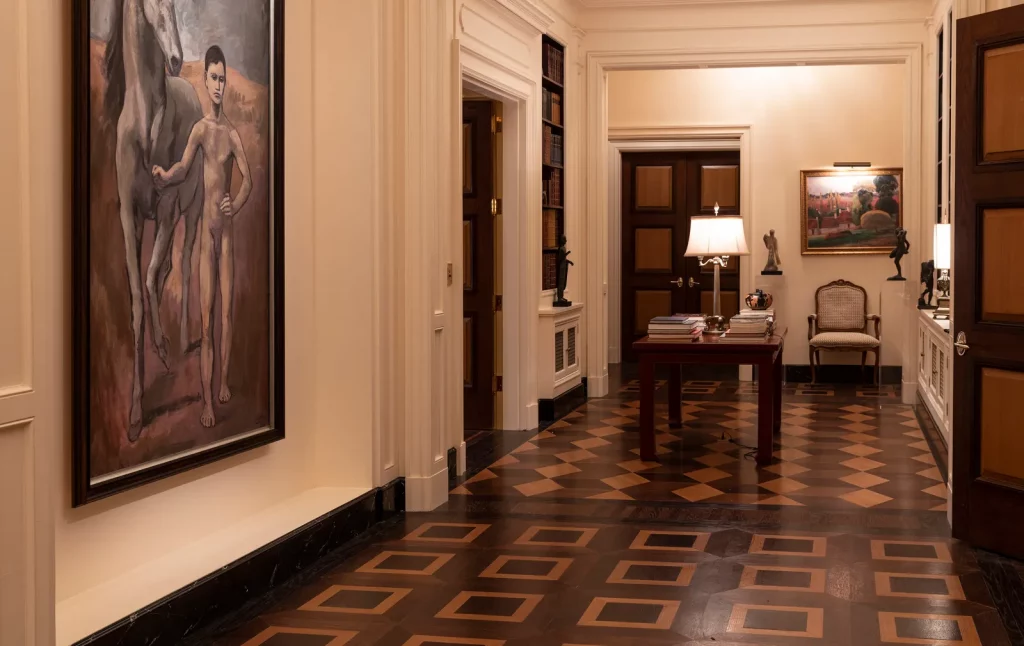
Picasso’s Boy Leading a Horse can be seen in the hall of Babe and Bill Paley’s New York apartment.
In 2022 and 2023, 29 works from the Paley collection were auctioned at Sotheby’s to fund MoMA’s digital expansions and other philanthropic endeavors—these included works by Francis Bacon, Picasso, Renoir, Andre Derain, and Henri Rousseau. Oh, and here’s a viewing tip: Picasso’s Boy Leading a Horse can be spied behind a weeping Babe Paley in the opening scenes of the first episode.
C. Z. Guest, a Modern Art Muse
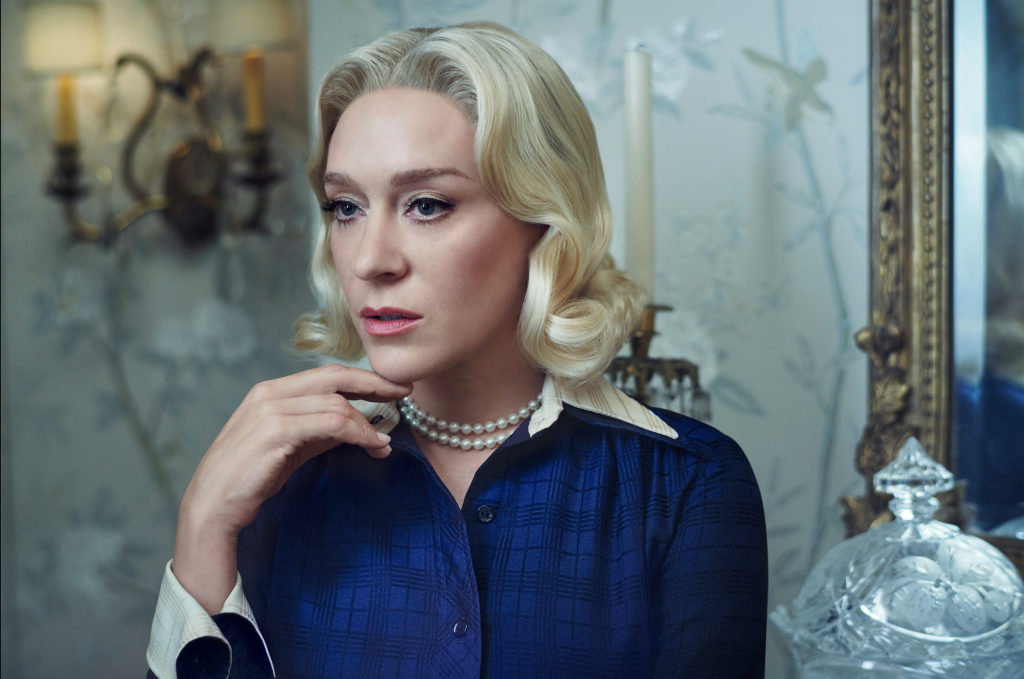
Chloë Sevigny as C.Z. Guest. Courtesy of FX.
Lucy Douglas “C. Z.” Cochrane Guest was a woman Capote once referred to as “cool vanilla lady”—a description that hinted at her aloof demeanor as well as her coif of platinum blonde hair. Played in the series by the ever-chic Chloë Sevigny, Guest was a true multihyphenate in the 1970s scene, known as an actress, equestrian, author, and even the designer of a line of cashmere sweaters. Born to a family of ‘Boston Brahmins,” Guest married Winston Frederick Churchill Guest—cousin of Winston Churchill and a member of a family of British steel magnates—after a short stint with the Ziegfeld Follies.
Regarded as the most enigmatic–and the most loyal—of Capote’s Swans, Guest had a mysterious allure that captured the imaginations of a number of the 20th-century’s creative minds. And she had a rebellious streak, too: When she was a young woman, Guest posed nude for Diego Rivera. The painting, it is said hung in a bar in Mexico City for years, until her husband’s family purchased it. Salvador Dalí, another admirer, painted her portrait in 1958. Over the years, she was photographed by Slim Aaron and Cecil Beaton. Andy Warhol—who became a close friend of Guest’s socialite daughter Cornelia—would return to her likeness several times, even emblazoning her visage on the cover of a 1976 issue of Interview magazine. Guest’s real-life abode will supposedly be featured in an upcoming episode, and when it is we’ll be looking closely for Modern art cameos.
Lee Radziwill, Royalty with a Taste for the Renaissance
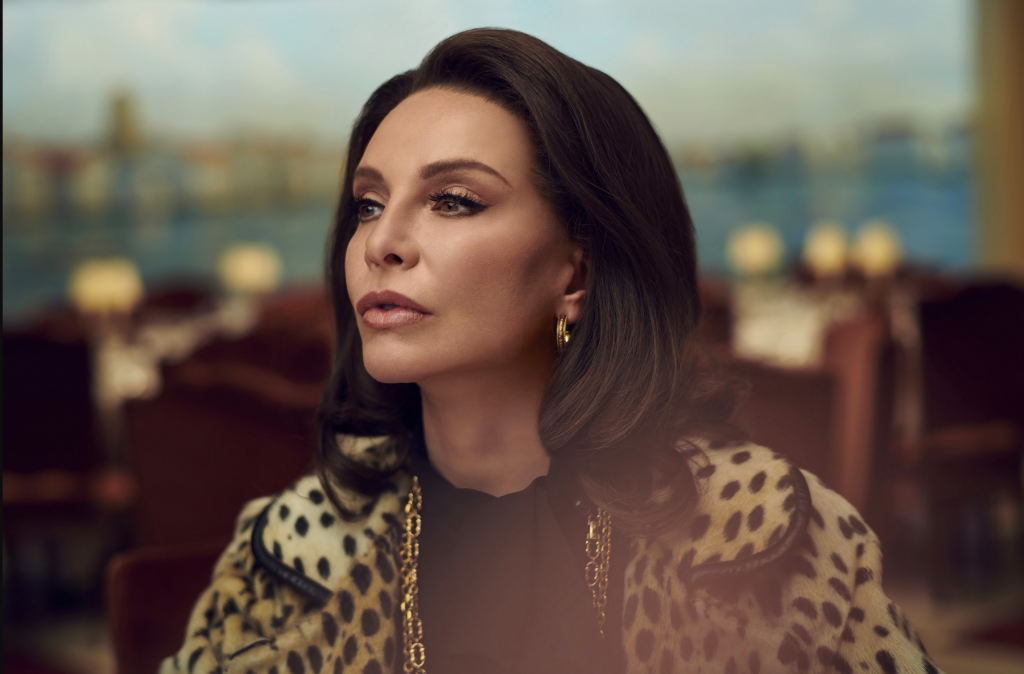
Calista Flockhart as Lee Radziwill. Courtesy of FX.
Lee Radziwill was the Swan with a royal title. Played by Calista Flockhart in Feud, Radziwill was born Caroline Lee Bouvier, the luminous younger sister of Jacqueline Bouvier Kennedy Onassis. After a short-lived first marriage at the age of 20, the younger Bouvier remarried at 25 to the consummately refined Polish-Lithuanian prince Prince Stanislaw Albrecht Radziwill, with whom she cultivated a life of luxury. Art was Radizwill’s first love, however, and the socialite had artistic inclinations all her own (a 2019 Christie’s sale of her collection included her own drawings). As a teenager traveling in Italy, she was so taken with the great Renaissance masterpieces that she tracked down the esteemed art historian Bernard Berenson, whom she would remain in correspondence with until the end of his life.
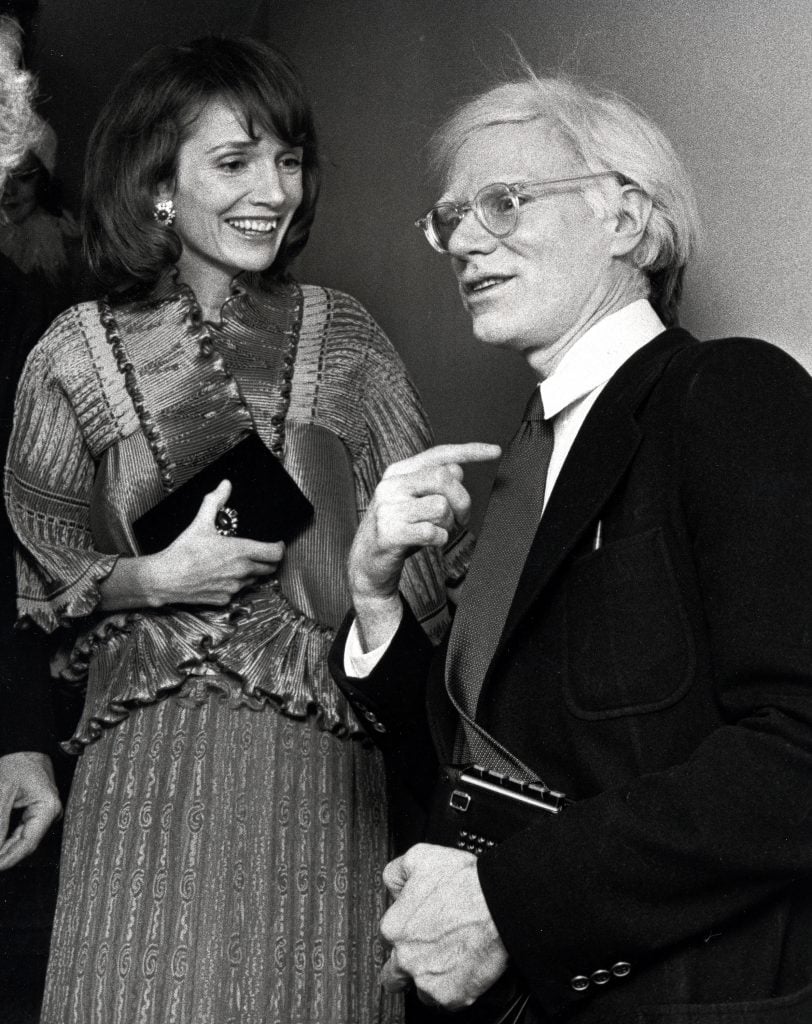
Lee Radziwell and Andy Warhol during Metropolitan Museum Costume Exhibit – December 11, 1975 at Metropolitan Museum of Art in New York City, New York, United States. (Photo by Ron Galella/Ron Galella Collection via Getty Images)
Amid her life of diplomatic duties as the sister-in-law of the President and her ultra-booked calendar in the socialite scene in New York, she always found time for art. “I am so terribly thrilled when I find anything concerned with art and at the height of enjoyment in an art gallery or museum,” she wrote in a letter to Berenson. Radizwill was anything but stuffy, however, and made appearances at Warhol’s Factory (Warhol captured her likeness with a Polaroid portrait) and visited his Montauk home. She was also a close friend of the photographer Peter Beard. She was passionate about interior design, too, a field that she pursued professionally. Her collection, which sold at Christie’s in 2019, was a testament to her wide-ranging tastes, from Renaissance and Neoclassical paintings to illustrations, furniture, jewels, and photography.





